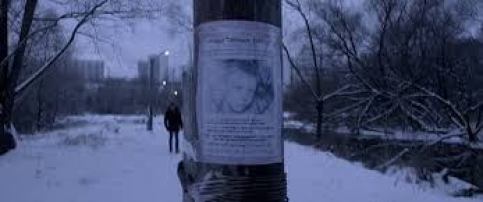Apparently the title of this Russian film comes closer to ‘Non Love’ than ‘Loveless’. There is absolutely not one speck of love. The beginning is arrestingly bleak: slow shots of a snow-covered river bank with piercingly clashing splinters of music. When will we see some life? I wondered.
After quite some time we see a brief shot of some ducks on the river with their young, then the camera dwells on an unwelcoming concrete building with a flag over the door. We wait – and at last, people – it is a school and the children burst out of the doors at the end of a school day. One of these children is 12 year-old Alyosha.
This portentous opening immediately reminded me of another Russian movie I saw in 2012: Elena. At the time I described the opening: ‘slow-paced and tense, with wonderful use of sounds – to start with, the early morning sounds as we watch a well-to-do apartment in Moscow gradually coming to life: bird sounds, then traffic sounds, an electric razor. … Phillip Glass’s third symphony pounds through the film, helping to create an atmosphere of tense desperation’. Both films were directed by Andrey Zvyagintsev.
 Alyosha’s parents are separating. Each has a lover. They must stay in the apartment – Alyosha’s home – until they can sell it. They argue about what to do with Alyosha – he is an inconvenient piece of property – his mother doesn’t want him. She never wanted him in the first place.
Alyosha’s parents are separating. Each has a lover. They must stay in the apartment – Alyosha’s home – until they can sell it. They argue about what to do with Alyosha – he is an inconvenient piece of property – his mother doesn’t want him. She never wanted him in the first place.
The father thinks that a child is the mother’s responsibility. Alyosha overhears this argument. We see him hiding behind a door, contorted with anguish.
Later, the mother confides to her hairdresser that the pregnancy was an accident – a kind of trap: she was scared to have an abortion and scared to give birth. She tells her lover that she couldn’t stand the sight of Alyosha when he was brought to her after the birth and she didn’t have any milk.
I wondered whether it is possible for parents to have absolutely no feelings for their child. I also wondered whether the lover could continue to love this woman who, towards her child, is so stonily unloving. He tells her she is a beautiful monster.The mother comes back to the apartment late one night after an evening with her lover. She doesn’t even check that Alyosha is okay. She learns that he is missing when the school reports his absence. And when the father hears of this (he was spending the evening with his new, pregnant, girl-friend), he doesn’t show any signs of guilt.
As we watch the bitter exchanges between Alyosha’s parents and then, when he has been reported missing, the prolonged searching by volunteers (the police department is useless), there is a counterpoint that draws attention to the hollowness of present-day affluent Russia society: plenty of wine, selfies, sex happening everywhere – amazingly (to me) Alyosha’s father is worried that he will be fired from his comfortable job if it is known that he is divorcing. In that workplace the boss instils a kind of Sharia Christianity – one must be married, one must have children, the façade must be preserved at all costs.
A news broadcast refers to a Mayan prediction of the apocalypse due on 21st December and there are other bulletins describing how the world is in turmoil.
The search for Alyosha is thorough, thanks to the volunteers. He is never found. I had been worried that we might find he had hanged himself from one of the bleak trees by the river— early on there are a couple of references that suggest hanging: on his way home from school, walking along the riverbank, Alyosha throws some leftover construction tape over a high branch of a tree. In his room there are some small rings hanging from ropes. But the film is too subtle for such revelation. At the very end we see the construction tape still in the tree, blown by the wind.
Some years after Alyosha’s disappearance, we observe that the removal of their son from their lives has been no assistance to the parents, who are now living with their respective lovers. The father is obviously repeating the ‘mistake’ he made with Alyosha. He and his lover now have a blond-haired toddler, who looks like a young version of Alyosha, but the father, who seems to be unemployed, is irritated by the young child and treats him roughly. And the mother, living with her lover, spends her time on a gym treadmill – boring, repetitive, on the sleety balcony. Her tracksuit top suggests that, with this dull routine, she represents Russia.
 And, years later, there are still signs pasted around a severe, dismally cold city advertising that a 12 year-old boy is missing.
And, years later, there are still signs pasted around a severe, dismally cold city advertising that a 12 year-old boy is missing.
Jennifer Bryce wrote about Brett Dean’s Hamlet in our first issue. This issue, she looks at three quite different films.




